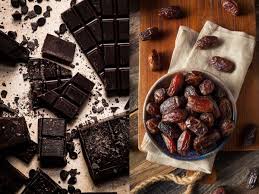Choosing a snack that satisfies your sweet tooth and supports your health can be a challenge, especially when the options are as delicious as dark chocolate and dates. Both are hailed as “better-for-you” alternatives to processed candy, but which one deserves a permanent spot in your pantry? Let’s break down what nutritionists have to say about their sugar content, fiber, antioxidant benefits, and more.
Sugar Showdown
When it comes to sugar, dark chocolate—especially the high-cocoa variety (70–85%)—comes out on top for those watching their intake. A typical 30g serving of 70–85% dark chocolate contains about 6–7g of sugar, while two medium-sized dates deliver around 16g of natural sugars. In fact, dates have approximately 68–75g of sugar per 100g serving. While that sugar is natural, it still packs a glycaemic punch, potentially leading to higher blood sugar spikes and cravings if overeaten.
Nutritionists note that the lower sugar in dark chocolate makes it a preferable option for individuals managing their blood sugar or aiming to curb excess intake.
Antioxidant Power
Here, dark chocolate is the clear winner. The flavonoids—especially epicatechin and catechin—in rich dark chocolate have been linked with improved vascular function, lowered blood pressure, reduced inflammation, and better insulin sensitivity. This makes dark chocolate an antioxidant powerhouse, potentially offering protection against oxidative stress, heart disease, and neurodegeneration.
Dates, meanwhile, do contain antioxidants like carotenoids and phenolics, but in smaller concentrations compared to those found in high-percentage dark chocolate. This gives dark chocolate the edge for those seeking a boost in antioxidant capacity.
Fiber & Satiety
Dates score big points on fiber: you’ll get about 3.3g of dietary fiber from just two dates, making them a great choice for gut health and keeping you feeling full. While dark chocolate also contains fiber (about 3g per 30g serving), dates offer a more “natural” source that can aid regularity and may help with cholesterol management.
However, some studies note that certain compounds in dark chocolate (polyphenols) may trigger satiety hormones like GLP-1 and PYY, which helps with appetite control—a useful benefit for those watching their portions.
Nutrients & Minerals
Both treats offer a range of key minerals, but in different proportions. Dates are naturally rich in potassium, magnesium, iron, and vitamin B6. These support heart and nerve function, digestion, and overall energy. Dark chocolate, meanwhile, provides not only iron and magnesium, but also copper and zinc—crucial for immune support and cardiovascular health.
Emotional & Mood Benefits
Let’s not overlook the emotional aspect! Dark chocolate is associated with mood-lifting effects, attributed to its content of theobromine and certain endorphin-boosting compounds. Having a small amount can genuinely brighten your day—just remember to enjoy it in moderation.
The Verdict: Which Sweet Treat Wins?
Nutritionists agree that both dark chocolate and dates have a healthy role to play when eaten smartly and in moderation. Choose dark chocolate (at least 70% cocoa and low sugar) for heart health, powerful antioxidants, and a satisfying treat with limited sugar. Opt for dates when you want a quick energy boost, more dietary fiber, and a mineral-rich, naturally sweet snack.
Whichever you prefer, both are superior to processed sweets and can be incorporated thoughtfully into a balanced diet. Moderation is key: enjoy the benefits without overindulging, and your sweet tooth—and your health—will both thank you!
Sources: India Today, Healthline, Medical News Today, Yahoo, India Today, India TV News, Cleveland Clinic






